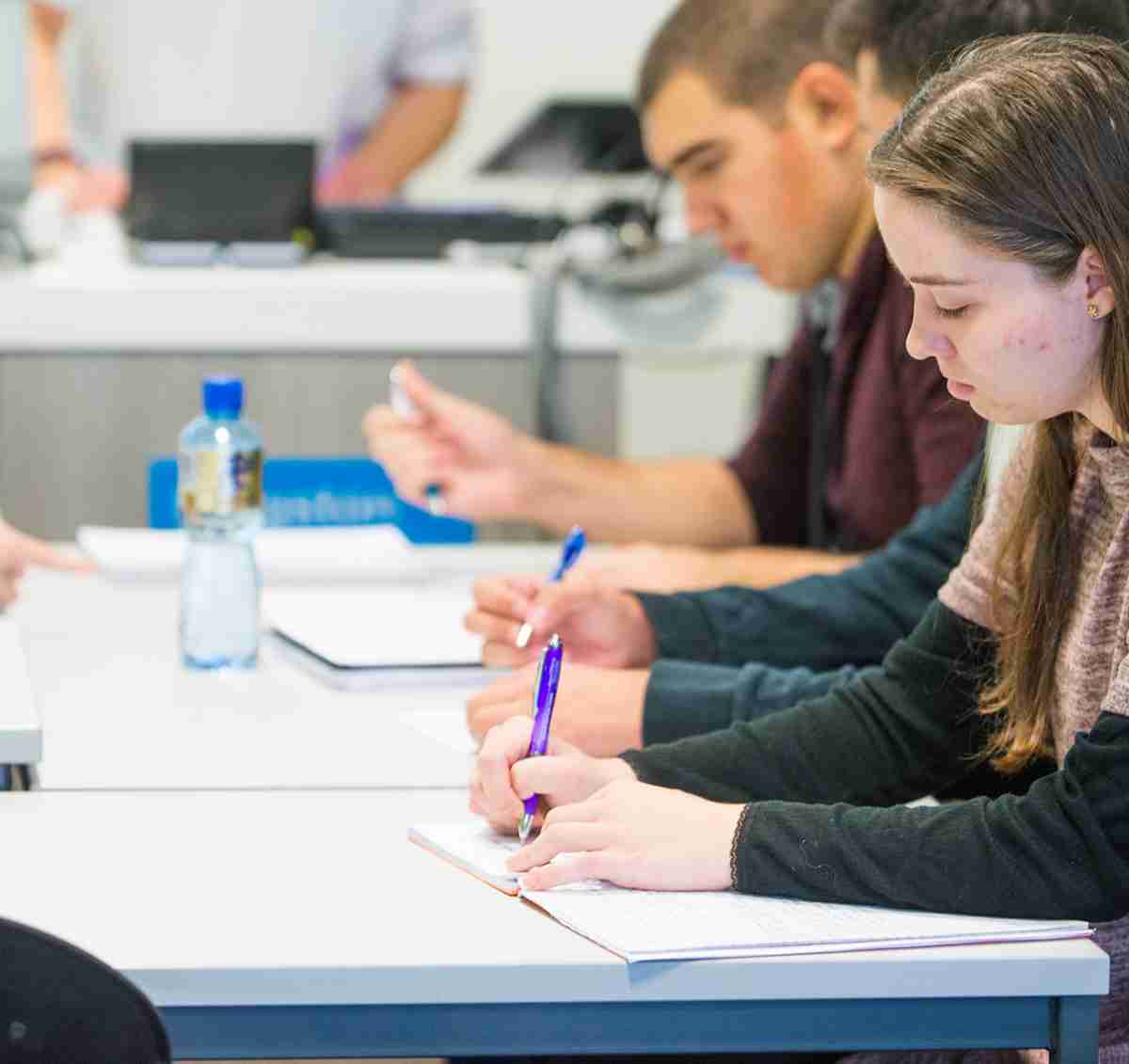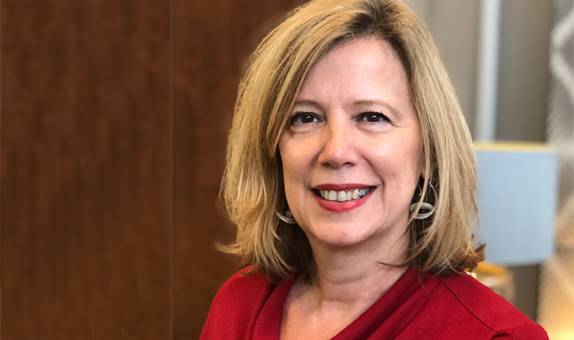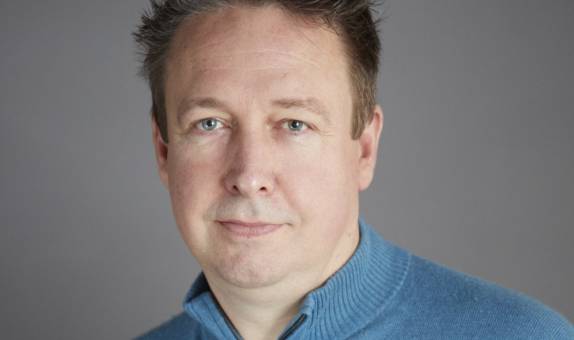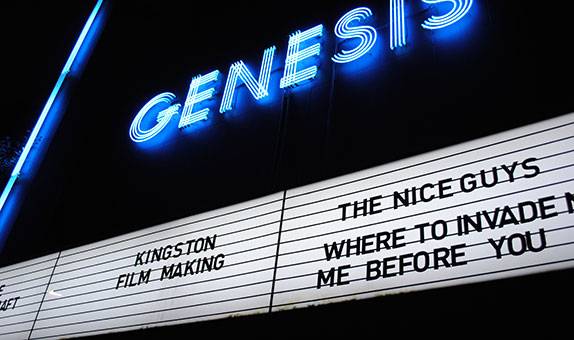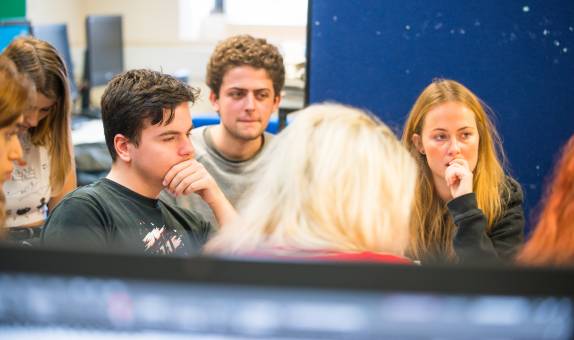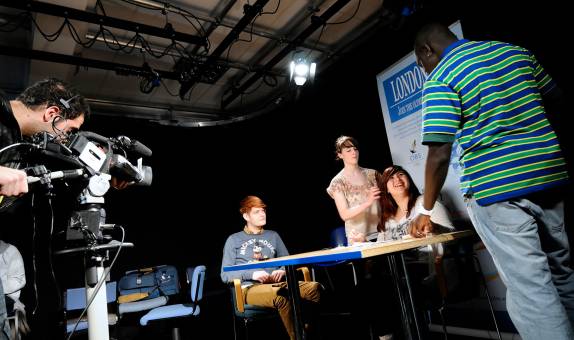Media Skills BA (Hons) top-up

Teaching Excellence Framework (TEF) Gold award
Our commitment to high quality teaching has been recognised with a TEF Gold rating. The University has received an overall rating of Gold, as well as securing a Gold award in the framework's two new student experience and student outcomes categories.
Why choose this course?
Do you want to fast track to a BA (Hons) degree? If you have a foundation degree in Media Skills (or equivalent), this one-year course is just right for you. It'll help you develop advanced practical skills in media and communications.
You'll work on exciting, creative projects. One of the main characteristics of this course is the integration of theory and practice. Students have developed social media strategies, filmed promotional videos and produced video essays, documentaries, websites and podcasts.
You'll work on a major piece of independent research as a practice-based dissertation, and to further develop professional skills necessary for employment, you'll organise a middle of the year symposium and present your work in progress.
| Attendance | UCAS code | Year of entry |
|---|---|---|
| 1 year full time | P302 | 2024 (Clearing) 2025 |
Please note: Teaching on this course may take place on more than one KU campus.
| Main Location | Penrhyn Road |
Reasons to choose Kingston
- Kingston University was ranked No. 2 in London and Top 10 in the UK for Media & Film Studies in the Guardian University Guide 2024.
- This course prepares you for a career in the creative sector and media production. You'll have opportunities to undertake work placements and attend bespoke career and employability events for working in the creative industries.
- You'll develop transferable skills such as writing, presenting, researching, teamworking and communication, relevant to a wide range of careers in media and beyond.
- You'll have access to the latest digital equipment, such as specialist film and media labs, a film studio, audio recording facility, green screen, TV studio and Mac labs.
Career opportunities
We work closely with the Careers and Employability Team to embed skills in our curriculum and help students to shape their career. Recent graduates work as social media managers, account executives, digital journalists, copywriters, web editors and video producers. Employers include Barcoff studios, Apple, the BBC, Saatchi Gallery, Discovery Channel, Google Play and Winkreactive.
The Art School Experience
As part of Kingston School of Art, students on this course benefit from joining a creative community where collaborative working and critical practice are encouraged.
Our workshops and studios are open to all disciplines, enabling students and staff to work together, share ideas and explore multi-disciplinary making.

What you will study
You can choose from a range of modules to suit your interests. Popular modules include:
- Media Research Project
- Television Production
- Issues in Media and Culture with a variety of strands
Modules
The year is made up of four modules each worth 30 credit points. Typically a student must complete 120 credits.
Top-up year
Core modules
Media Research Project
30 credits
This module integrates multidisciplinary creative practices, theories of media and communication and research methods while undertaking an extended piece of writing or practice-based research. In the process, you will become more aware of theoretical debates, review research strategies, analyse the findings, synthesise research, develop a coherent, structured argument and draw conclusions.
It fosters a deeper understanding of what it is to be a researcher and creative practitioner in the media industries and professions, in the arts and social sciences, media arts and technology, digital humanities and cultural studies. It is pretty much up to you! You come up with a topic that really interests you and start researching.
As well as attending the seminars, this module is about working independently and discussing your work with your supervisors so they can guide your research. In addition students will work together to organise a symposium and present their work. In doing so, they will develop their critical analytical and transferable professional skills.
Optional modules
Issues in Contemporary Media Environments
30 credits
This strand-based module builds on students' awareness and experience of living in contemporary digital media environments. Strands vary each year to reflect current debates related to one area of practice and research in emerging media technologies. Each strand will look at how the selected issue is represented in public debates, or how it is treated in media policies and regulations. Strands are broadly focused on: AI and machine learning, issues in digital art practices, cult social media and digital folklore, evolution of celebrity and influencer cultures, sustainability; environmentalism; and transnational online streaming environments.
Each strand is taught by a different lecturer and has its own syllabus and reading lists. Whilst the number and specific focus of the strands may vary from year to year, the content is always current and teaching delivery pattern as well as assessments in various strands remain the same.
Box Set Television Drama
30 credits
Drama has always been a key TV genre - and with the rise of streaming platforms like Netflix, Amazon we can binge-watch more than ever. In Box Set Television Drama, we'll explore how a successful series is created – and how to pitch one.
Television Production
30 credits
This is a practical module designed to enable students to experience and work in a professionally-focused industry environment, and develop television production skills such as multi-camera operation, sound, mixing and teleprompting. Students will learn how to work and operate a professional broadcast studio as well as developing TV production skills. In addition, students will build on and reinforce employability skills such as problem-solving, time management and dependability sought by employers looking to fill graduate positions. Students will be encouraged to reflect on their professional practice and critically evaluate their teaching and learning contributions.
Working in the Media
30 credits
This highly practical module allows students to explore in-depth and actively engage with a range of work sectors and job functions in the media, communications and creative industries which could include, for example: PR and Advocacy, Social Media, Creative Media, Project Development and Management, Publishing etc. They will apply their newly-gained specialist knowledge using their acquired skills to the production of a portfolio of cutting-edge media and communication outputs to facilitate their transition into graduate level employment
Parallel taught sessions will help students to develop their critical thinking and to consider what is required to become a reflective practitioner. These classes will also look at career development and offer information and discussion on graduate progression and employability skills as well as jobs in media, communication and related areas.
Special Study: Art/Media Management and Production
30 credits
This module examines art/media management and production in relation to opportunities and challenges posed in the current digital landscape. Students will learn how projects are managed; rights management issues, defining and understanding rights in the context of their own topical areas of interest; professional practice; production work.
Looking at copyright, brand rights, image rights, privacy, freedom of expression and information, censorship, and regulation - students explore how these work in practice. They also develop knowledge and understanding of the use of agreements and licensing. Students have a wide range of case studies to explore: film, music, fashion, advertising, PR, publishing, and art; global media production and cultures of appropriation.
There will be an opportunity for portfolio development and the study of theoretical aspects of ‘digital disruption', the impact and use of free/open media and how making media is affected by share culture, remix/mashups. To understand what happens to art and media work once produced, we also look at distribution, the rights affecting distribution, and the impact on: download culture, cultural appropriation, globalisation; transborder flow, media convergence and spreadability.
Please note
Optional modules only run if there is enough demand. If we have an insufficient number of students interested in an optional module, that module will not be offered for this course.
Future Skills
Knowledge to give you the edge
Embedded within every course curriculum and throughout the whole Kingston experience, Future Skills will play a role in shaping you to become a future-proof graduate, providing you with the skills most valued by employers such as problem-solving, digital competency, and adaptability.
As you progress through your degree, you'll learn to navigate, explore and apply these graduate skills, learning to demonstrate and articulate to employers how future skills give you the edge.
At Kingston University, we're not just keeping up with change, we're creating it.

Entry requirements
If you would like to join us through Clearing 2024, please call our Clearing line on 0800 0483 334 (or +44 020 8328 1149 if you are calling from outside the UK) and speak to our friendly and knowledgeable hotliners who will be able to provide information on available courses and will guide you through your options.
Please note the entry requirements listed below are for 2025 entry only.
Teaching and assessment
Scheduled learning and teaching on this course includes timetabled activities including lectures, seminars and small group tutorials.
It may also include critiques, project work, studio practice and performance, digital labs, workshops, and placements.
Who teaches this course?
Many of the teaching team are media practitioners and theorists who bring their professional and academic expertise into the classroom: they will help you to develop your skills, networks and gain access to industry contacts. Their expertise and knowledge is closely matched to the content of the modules on this course.
Academic teaching is supported by visiting speakers, industry professionals and guest lecturers who enhance your learning.
Course fees and funding
Additional costs
Depending on the programme of study, there may be extra costs that are not covered by tuition fees which students will need to consider when planning their studies. Tuition fees cover the cost of your teaching, assessment and operating University facilities such as the library, access to shared IT equipment and other support services. Accommodation and living costs are not included in our fees.
Where a course has additional expenses, we make every effort to highlight them. These may include optional field trips, materials (e.g. art, design, engineering), security checks such as DBS, uniforms, specialist clothing or professional memberships.
Facilities
The campus at Penrhyn Road is a hive of activity, housing the main student restaurant, the learning resources centre (LRC), and a host of teaching rooms and lecture theatres.
At the heart of the campus is the John Galsworthy building, a six-storey complex that brings together lecture theatres, flexible teaching space and information technology suites around a landscaped courtyard.
After you graduate
The focus of this course is to prepare you for a career in the creative sector and media production, however, you will also develop transferable skills (such as writing, presenting, researching) relevant to a wide range of careers.
Our graduates have followed careers in a wide range of sectors and media industries, working at local, national and international level (e.g. BBC, Discovery Channel).
Course changes and regulations
The information on this page reflects the currently intended course structure and module details. To improve your student experience and the quality of your degree, we may review and change the material information of this course. Course changes explained.
Programme Specifications for the course are published ahead of each academic year.
Regulations governing this course can be found on our website.


